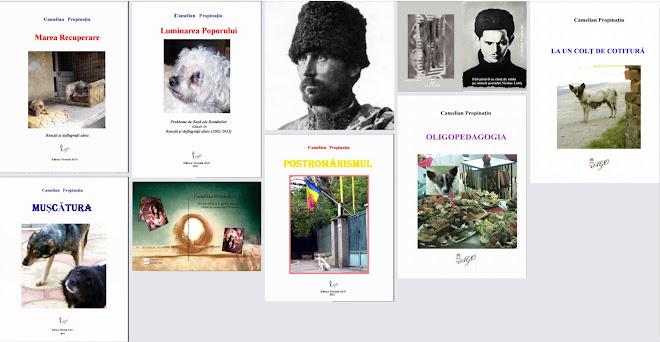How is emerging countries perceived by Trump's latest appeal to Ukraine to capitulate?
In summary, emerging countries and Europe's dominant voices largely perceive Trump's appeal to Ukraine to capitulate as a controversial, risky pivot that could weaken Ukraine's position, empower Russia, and marginalize European influence on the conflict's resolution. Nonetheless, some recognize the pragmatic motivations behind it and the desperate search for an achievable peace amid ongoing conflict realities.”
*** ***
Precum sub ceaușism, vom regreta timpul pierdut la spectacolul corupției, incompetenței, nesimțirii și inculturii. Măcar acum știm că a fi incult după globalizarea webară e o opțiune a pământeanului.
Florica Dobre, Alesandru Duțu - Distrugerea elitei militare sub regimul ocupatiei sovietice in Romania, Volumul I - 1947-1964, Institutul Național pentru Studiul Totalitarismului, 2001
Giurescu, Dinu C. - Distrugerea trecutului României, București, Editura Museion, 1994, 96 p.
Cristian Vasile - ,,Un turn de fildeș în comunism? Institutele umaniste ale Academiei RPR în România lui Gheorghiu-Dej”
Cosmin Popa, ,,Intelectualii lui Ceaușescu și Academia de Științe Sociale și Politice (1970-1989)”.
Daniel Gamburg, Simon Shuster - The Showman: Inside the Invasion That Shook the World and Made a Leader of Volodymyr Zelensky
Consolare
în toate, listele clasice de cărți bune:
https://propinatiu.wordpress.com/lista-lui-propinatiu
Carte
străina clasică gratuită:
https://archive.org/details/fav-camelian_propinatiu?sort=creatorSorter
De când asist la acest măcel sălbatic pornit în Est, apoi și în Levant, de netolerat în secolul XXI al super-tehnologiilor, citesc din Armand Hrestic - Războiul Sfânt (vol. I-IV), un fel de Lev Tolstoi - Război și Pace, cu naratologie încâlcită din proiect să te plictisești de la Joyce și Musil până la Pynchon și să abandonezi.
https://archive.org/search?query=Hrestic
http://propinatiu.ro/carti
*** *** *** ***
Europe,
a key group of emerging and developed countries, has largely rejected and
criticized the plan, seeing it as unfavorable to Ukraine and a European
interest. European leaders like those from Germany, France, and Britain have
dismissed it as a "capitulation" and pushed for alternatives.
Meanwhile, there is concern that if Ukraine is pressured into accepting Trump's
plan, and Russia engages, Europe could be sidelined in the resulting
settlement.
Beyond
Europe, perceptions among emerging countries may be more varied. Some
authoritarian or illiberal regimes might see Trump's approach as an opening to
strengthen ties with a Washington perceived as less focused on combating
autocracy. Globally, attitudes toward democracy also shape views, with liberal
democracies generally opposing Russia and China while more authoritarian
societies exhibit differing sympathies.
In
summary, many emerging countries and international actors seem cautious or
critical of the plan, particularly its implications for Ukraine's sovereignty
and territorial integrity, but some recognize its potential to end prolonged
conflict pragmatically. European reactions underscore concerns over losing
influence and the impact on Ukraine's future, reflecting the complexity of
global perceptions around Trump's appeal for Ukraine to relent in its
territorial...”
*** *** *** *** *** ***
However,
we can infer potential perceptions based on general trends, the nature of the
proposal, and known positions of developing nations:
### 1. **Perception of Sovereignty and Precedent**
* **Concern over Unilateral Concessions:** Emerging countries generally hold strong views on **national sovereignty** and the inviolability of borders. A peace plan perceived as a "capitulation" or one that rewards military aggression with territorial gains—especially if pushed by a major global power—could be seen as setting a **dangerous precedent**.
* This precedent could make smaller, less
powerful nations more vulnerable to similar pressures or invasions, violating
the UN Charter principle against changing borders by force.
### 2. **Focus on Economic Stability**
*
**The *How* Matters:** However, if the peace deal is seen as inherently
unstable and likely to lead to renewed conflict down the road (due to unfair
terms or inadequate security guarantees), that initial relief would be tempered
by fear of another, potentially worse, economic shock.
* Some emerging nations might view this as
confirmation that the US is shifting away from being a reliable security
guarantor for its partners, which could encourage them to pursue more
*non-aligned* foreign policies.
*
**A Shift in Power Dynamics:** A plan perceived as favorable to Russia could
signal a shift in the global balance of power or a weakening of Western
resolve. Nations seeking to hedge their bets or balance their relationships
with major powers (US, Russia, China) might adjust their diplomatic stance
accordingly.










Niciun comentariu:
Trimiteți un comentariu
Rețineți: Numai membrii acestui blog pot posta comentarii.